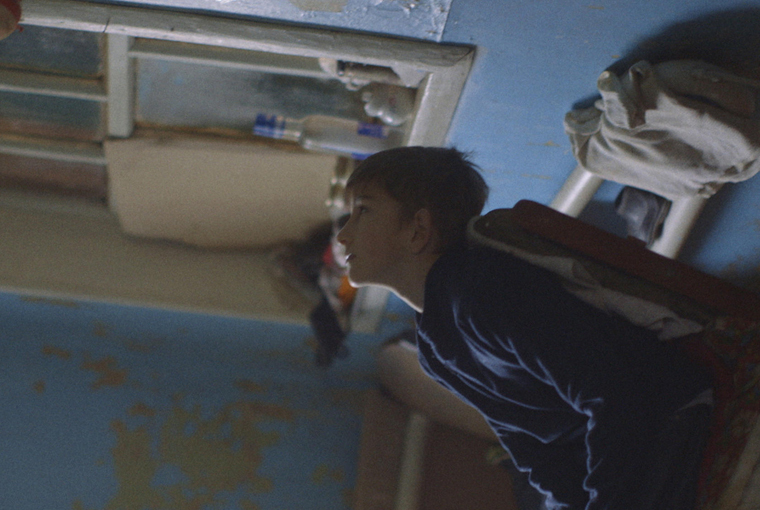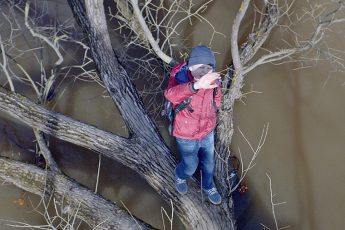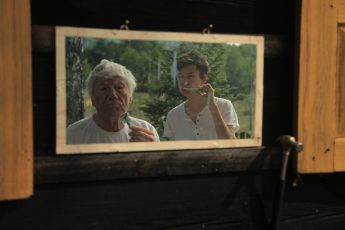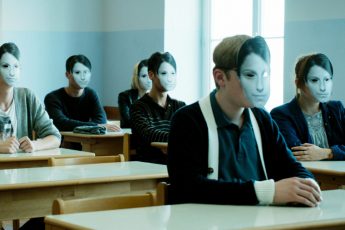A Grim Farewell to the Innocence of Youth
Artem Aisagaliev’s Babai (2019)
Vol. 106 (Summer 2020) by Jack Page
Two young brothers (Gesha and Mark) are driven by their abusive and cold-hearted father to their grandparents for the weekend. When they aren’t being reprimanded for their misbehavior in public, they escort their grandfather on his daily business route. Constantly downtrodden and ridiculed, they spend their childhood disregarded and marginalized. Gesha is a particularly sensitive boy who, on a trip out to the country, witnesses the slaughter of a sheep. As the animal’s neck is cut and the bucket fills with blood, he runs away. Gesha’s escape from the farm is interspersed with shots of organs splayed onto the ground, pale and bloody. A search party wanders the fields, calling out his name as they aim their dwindling torches at the evening sky. The light continues to fade as the group fail to find the child in the dark abyss before them. It is futile, Gesha is gone and he will never be found.
“Babai”, the film’s title, refers to a bogeyman born of Slavic folklore. Any misbehaving children that refrain from the rules of bedtime etiquette are told that if they don’t go to sleep, they will be spirited away by the demon. The resonance of this in the film stems from the adult’s employment of fear as a tool to belittle and punish the boys. There is a persistent and heavy sense of dread that hangs over the head of Gesha and Mark (played by the director’s real-life siblings Gesha and Mark Aisagaliev). It seems to squash them, dominating the frame. It is the formidable presence of the adults that they share scenes with. It is the potential trauma that the grown-ups represent. A bullying remark or physical abuse plagues the parenting style of their father. Their promise of nurture becomes unwanted attention, a suffocation, to the extent that they try to make themselves invisible in the household. The Babai myth also represents the older fashioned and outmoded traditions of past generations that inform their family’s values and are unwillingly put upon the impressionable and innocent young protagonists.
Aisagaliev litters the film with quintessential moments of early childhood, instilling in the spectator relatable memories of any upbringing. The first shot of Babai is indicative of this, where the camera lingers in an extreme close up of Gesha’s nose. The boy’s cheeks are streaming with tears, flooding his top lip. Mucus drips from his nostrils into the creases of his frown. The redness of his cheeks bleeds into the waves of bodily fluids collecting at the bottom of his cherubic face, like a melting waxwork model. Gesha’s frail sobs are heard over his father’s yelling. Sniffling but silent, the boy is berated with unnecessary swearing and shouting. It is a traumatic scene to behold, but an all too familiar one. By building a sensory aesthetic, almost abstract even, the director reimagines a universal childhood memory. Gesha’s pain and humiliation is immediately recognizable, forcing the audience to revisit their own personal history in which they share a similar scene. It is an engaging and unflinching opening sequence that intends to remove the viewer entirely from their comfort zone and empathize with the child.
The brothers embrace the festive season, in spite of any given holiday celebrations. While the adults participate in a crass discussion regarding homemade caviar around the dinner table, the two boys slink away, completely ignored by their elders. Unacknowledged, Gesha and Mark brave the grey, municipal environment to purchase a Christmas tree. A flurry of fairy lights floods the screen as they decorate it. Filtered through a screen door, a blue hue is projected over the sequence, offering an illuminous respite from the otherwise bleak surroundings. It suggests a glimmer of normalcy, of hope and happiness where there has been only gloom. This routine, sparked by the children themselves, acts as an olive branch to their formative years, proposing that it might not all be so bad. Similarly, the audience shares Gesha and Mark’s point of view in these fleeting, celebratory scenes. Fireworks light up the city skyline, painting the drab urban estate with a sparkling gold outline. Despite the alarms ringing and the clouds of pollution that blur the explosions of color, these magical pyrotechnics briefly transform the world Gesha and Mark inhabit. The lightshow offers them an escape from their harsh reality, but their sense of wonder and awe is short-lived, just like the fireworks themselves.
Babai is a cautionary tale that warns of the vulnerability of children, the importance of parental nourishment and the inexorable loss of innocence. However, it is not devoid of social commentary either, as Gesha and Mark are victims of circumstance and products of their environment. Their narrative hints at the proliferation of poverty. The two boys literally spend the duration of the film following in the footsteps of their elders, trading in the black market and participating in low-grade dealings. For example, Gesha and Mark accompany their grandfather to locate the coveted local delicacy of homemade caviar. They await the arrival of the goods, nervously staring at the men playing backgammon in what appears to be an abandoned building site. When the priceless merchandise arrives at the quarry, it is stored in the boot of an unmarked car. As well as these potentially illegal transactions, the boys catch a glimpse of what is quite predictably their own immediate future. A gang of youths vandalize property, smoking and heckling passers-by. These scenes which discourage negative habituation infer that Gesha and Mark will ultimately inherit the same misgivings as their family and environment.
The film ends as it begins, in total darkness. The fade-out to black is extenuated, only the ambient background sounds swell to fill the empty space. Industrial drills whirl, car horns blare, dogs whine and trains echo into the distance. The absence of image and the mundanity of diegetic sound suggest an absence of feeling, a numbness that is proliferated by the unresponsive nature of the boys’ performance. They act as if they’ve been hollowed out, fundamentally sheepish and skittish to the sensory bombardment of the world they live in.




Leave a Comment